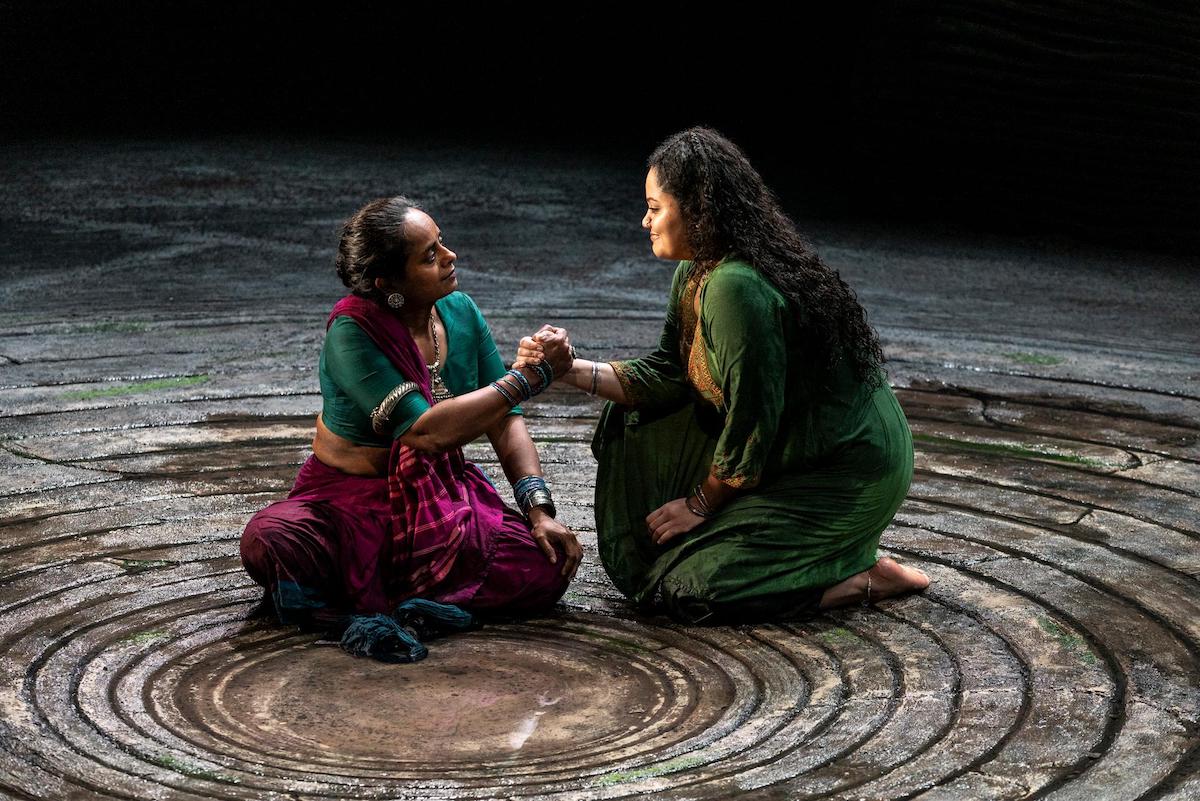It’s ironic The Wrong Gods, a work by Tamil playwright S. Shakthidharan set in India, should open the same night as that country fired missiles into Pakistan.
Shakthidharan, who goes by the name Shakthi, has made his name writing theatre about the bloody civil war of his parents’ Sri Lanka, notably the multi-awarded and critically acclaimed Counting and Cracking Counting and Cracking and its follow-up The Jungle and the Sea.
This latest work is about a war of a different kind, that between a mother and daughter, the old ways and the new and nature versus supposed progress in a remote rural village alongside a mighty river in India’s Narmada Valley.
Shakthidharan’s two Sri-Lankan based stories are epics. While Counting and Cracking, originally mounted as part of the 2019 Sydney Festival, unfolds across three acts, five decades and four generations with 16 actors, this is almost the opposite: one location, two scenes and a cast of four women.
While both previous works were lengthy (Counting ran to three-and-half hours) this is a tight 90-minute, no-interval drama. Instead of working in collaboration with Belvoir’s Artistic director Eamon Flack, this time it’s Belvoir’s Resident Director Hannah Goodwin (The Curious Incident of the Dog in the Night-Time; Never Closer) co-directing.
Counting and Cracking was set in Sri Lanka and Australia from 1956 to 2004, and The Jungle and the Sea in Sri Lanka from 1995 until 2022. The Wrong Gods is set in India over a span of seven years. The scope is not as sweeping, but its themes are still big: asking if freedom is perhaps more dangerous than we think.
The play builds slowly with daughter Isha (Radhika Mudaliyar), dreaming of escaping her rural existence, arranged marriage to a local village boy, and mother Nirmala (Nadie Kammallaweera) for a career as a scientist in the city.
Her warrior woman mother, who has been fending for herself since the departure of her husband, is uneducated and has been working the fields, nurtured by nature and the river on lands her ancestors have sewn for centuries.
She’s instantly suspicious of the “rich American bastards who come to her village” as she calls them… promising an end to that backbreaking work with genetically modified seeds, tractors instead of cattle, money in the bank instead of barter in the village. They bring new Gods, and new ways, the old woman doesn’t trust.
But when the mysterious Lakshmi (Vaishnavi Suryaprakash) promises to take her beloved daughter to the city for a university education, the deal is sealed.
Ultimately Nirmala soon realises she has made a pact with the capitalist devil. She loses her daughter for seven years – during which time she begins to hate herself she is so lonely. While her daughter is gone, Diva (Manali Datar) forges a bond with Nirmala, and they band the villagers together in protest at what the multi-national corporation intends to do to their homelands.
The real tension begins, like rising water levels, when Isha returns to her village and her mother after an absence of seven harvests.
These four powerful characters fill the simple set designed by Keerthi Subramanyam. The drama mounts in the latter part of the play when it starts to rain on stage, a harbinger of the floods that threaten the villagers’ lives and livelihoods.
Original music by Hindustani musician Sabyasachi (Rahul) Bhattacharya, is sung beautifully by Datar and Mudaliyar.
This is a tale of local justice and global power but ultimately too, it’s about the myth of progress. It asks, is what we in the west and Indian cities worship any better than the temples of nature, lush with parakeets and kingfishers.
Counting and Cracking was last year named the best Australian play of the 21st century so far. Shakthidharan has again cemented himself as a master of South Asian storytelling. But this is not quite as triumphant. Didactic in parts, you can almost hear the essayist’s voice at times, it is not the easy dialogue and witty repartee of his previous plays.
But it leaves you questioning, as all good theatre should. The divine goddess maybe in us all, as Nirmala says, but what is divine?
